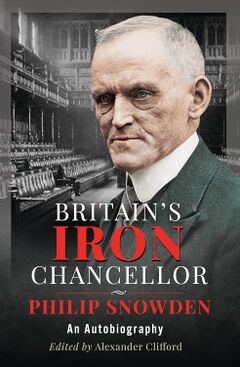Difference between revisions of "Philip Snowden"
(Importing from WP and expanding) |
|||
| Line 22: | Line 22: | ||
==Iron Chancellor== | ==Iron Chancellor== | ||
| − | A gifted orator, Snowden was regarded as the archetypal Yorkshireman; strong-willed and straight-talking, caustic and biting in his criticism but warm in friendship. He earned the moniker ' | + | A gifted orator, Snowden was regarded as the archetypal Yorkshireman; strong-willed and straight-talking, caustic and biting in his criticism but warm in friendship. He earned the moniker '[[Iron Chancellor]]' after doggedly standing up to the French during tense negotiations, with one Paris journal bawling, “There is only one thing left – we must occupy Yorkshire!” Snowden’s infamous 1931 election broadcast, in which he condemned [[Labour]]’s programme as “Bolshevism run mad”, played a major role in the National Government winning the biggest landslide in British electoral history. In 1934, Snowden wrote his autobiography.<ref>''[https://www.amazon.co.uk/Britains-Iron-Chancellor-Philip-Snowden/dp/1399024957 "Britain’s Iron Chancellor: An Autobiography"]''</ref> |
{{SMWDocs}} | {{SMWDocs}} | ||
| + | |||
==References== | ==References== | ||
<references/> | <references/> | ||
Latest revision as of 10:55, 4 August 2024
(politician) | |
|---|---|
 | |
| Born | 18 July 1864 |
| Died | 15 May 1937 (Age 72) |
Philip Snowden, Viscount Snowden was a socialist politician and propagandist and chancellor of the Exchequer in the first two Labour Party governments of Great Britain (1924; 1929–31).[1]
The son of a weaver, Snowden worked for the government as a clerk until he became crippled by a spinal disease. In about 1893, after partially recovering, he became a lecturer and writer for the Independent Labour Party (ILP), and from 1903 to 1906 he was national chairman of ILP. In the House of Commons (1906–18, 1922–31) he excelled in debates on social and economic questions. In 1921 he repudiated the ILP because of its increasing militancy.
Contents
Labour Chancellor
Snowden served as chancellor of the Exchequer in Ramsay MacDonald’s first Labour ministry (Jan. 22–Nov. 4, 1924). He returned to office in 1929 in MacDonald’s second government and faced a series of difficult government budgets owing to the deepening effects of the Great Depression. In 1931 he established Sir George May’s economy committee, which, by its recommendation that benefits for depression-induced unemployment be decreased, brought about the fall of the Labour ministry that year.
Coalition Chancellor
Continuing as chancellor of the Exchequer in MacDonald’s coalition National Government, Snowden carried through an emergency budget in September 1931 and secured Great Britain’s abandonment of the gold standard that same month. After leaving office in October, he was created a viscount and made lord privy seal, but he left that office in 1932. His two-volume Autobiography appeared in 1934.[2]
Snowden had no children, and the viscountcy became extinct upon his death.[3]
Iron Chancellor
A gifted orator, Snowden was regarded as the archetypal Yorkshireman; strong-willed and straight-talking, caustic and biting in his criticism but warm in friendship. He earned the moniker 'Iron Chancellor' after doggedly standing up to the French during tense negotiations, with one Paris journal bawling, “There is only one thing left – we must occupy Yorkshire!” Snowden’s infamous 1931 election broadcast, in which he condemned Labour’s programme as “Bolshevism run mad”, played a major role in the National Government winning the biggest landslide in British electoral history. In 1934, Snowden wrote his autobiography.[4]
Related Document
| Title | Type | Publication date | Author(s) | Description |
|---|---|---|---|---|
| Document:Britain didn’t vote Labour just to get a new iron chancellor | Article | 4 August 2024 | William Keegan | The economic damage wrought by Brexit continues. Our investment and growth prospects would benefit enormously if Starmer and Reeves abandoned this policy of “no return to the customs union, single market or freedom of movement”. I repeat what I have said before: the Labour manifesto commits it to removing unnecessary barriers to trade. But Brexit is the most formidable barrier of all! |
References
Wikipedia is not affiliated with Wikispooks. Original page source here